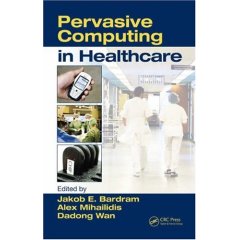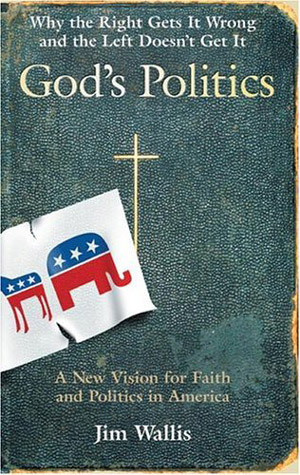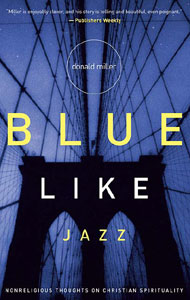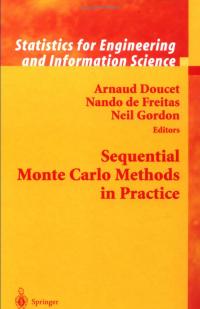WSJ editorial
Declarations - WSJ.com" Eras end, and begin. "God is in charge of history." And so my beautiful election ends."
(Stuff That I've Read For "Fun") Permanent Link made 7:55 AM | Comments (0) | TrackBack (0)
" Eras end, and begin. "God is in charge of history." And so my beautiful election ends."
(Stuff That I've Read For "Fun") Permanent Link made 7:55 AM | Comments (0) | TrackBack (0)
 Photo courtesy of tabrandt |
I just read a really powerful two-page essay on two competing ways of looking at repentance. It can be found here (by Tim Keller). Repentance can be either a self-centered, self-righteous atoning for your own sin, or it can be the process of more deeply understanding what Jesus has done for you. The liturgy for repentance from George Whitefield (circa 1738) is summarized toward the end: "Have I spoken or thought unkindly of anyone? Am I justifying myself by caricaturing (in my mind) someone else? Have I been impatient and irritable? Have I been self-absorbed and indifferent and inattentive to people?" "Have I avoided people or tasks that I know that I should face? Have I been anxious or worried? Have I failed to be circumspect or have I been rash and impulsive" "Am I doing what I am doing for God's glory and the good of others or am I being driven by fears, need for approval, love of comfort and ease, need for control, hunger for acclaim and power or the 'fear of man'?" It's hard to stand in God's presence and answer those questions |
(Stuff That I've Read For "Fun") Permanent Link made 1:06 PM | Comments (0) | TrackBack (0)

|
Tylenol PM not strong enough for you? Then I suggest you check out the following book Pervasive Computing in Healthcare. Chapter 4 is by my advisors and I! Everyone else is a bit bored by this, but it's my first book chapter, so I'm kind of jazzed. From Amazon: "With a holistic view, Pervasive Computing in Healthcare offers an overview of the subject and its application to problems in healthcare and disability. This book covers the basics, including various types of computer science tools and techniques, and introduces important models in applying technology to healthcare, disease, and disability. It presents specific examples of pervasive computing applications in various contexts, such as in the home or in the hospital, and how it can be applied as proactive or preventative methods to help with diseases. This text also provides an understanding of research and methodological issues related to developing technologies and evaluating their performance." |
(Stuff That I've Read For "Fun") Permanent Link made 5:00 PM | Comments (0) | TrackBack (0)

|
There is an interesting post at the Tomorrow's Professor's blog about how professors are "intellectual entrepreneurs." I think this describes very well what I spend my time doing: raising money, selling my ideas, training people to execute the ideas and to come up with their own under the umbrellla of a single research agenda. It just fits. The article is here. Choice quote: "Some may better understand what academics strive to do not by thinking of classes and books but of "intellectual capital." Like monetary capital, intellectual capital is the cumulative product of both individual effort and supportive communities. Intellectual capital is the dividend of years of hard work and practical experience that bears fruit by transforming lives and benefiting society." It gets a little self-aggrandizing at points, but the general idea is a good one. |
(Stuff That I've Read For "Fun") Permanent Link made 5:00 PM | Comments (0) | TrackBack (0)

I just finished reading an interesting paper from the UBICOMP 2005 conference, called "Living for the Global City: Mobile Kits, Urban Interfaces, and Ubicomp". It's available online for a fee, but if you hunt around you can find a free copy.
Anyway the paper was cool. The authors looked at young urban professionals in three citiies, LA, Tokyo, and London and looked at how the technology that they carried with them interfaced with the infrastructure in their location. The researchers were interested in what services were trusted and which were not and how private and public things were mediated by infrastructure.
Some cool quotes which give a flavor of the paper:
"We also sought with some skepticism, to assess the notion that places like London, L.A., and Tokyo actually form a coherent category - that they are essentially a single, distributed place, despite their apparent diferences."
"Much of what they carried with them are interface tokens" [emphasis mine]
"Mobile Kit" : this is the collection of technology, old and new that people carry with them.
"L.A., in particular, has captured the imagination of a group of urban theorists, resulting in an emerging field of 'Los Angeles Studies' ."
"What differences (if any) between global cities matter? To what degree is it warranted to talk of 'the global city' or 'urban computing' as if they were unitary domains?"
"Cocooning items...items that allow escape from one's current environment through creating a kind of 'bubble' in which outside distractions are shut out. ...iPod...."
Neat paper, one of those things that you read that inspire creative thinking because they are the result of good creative thinking.
(Stuff That I've Read For "Fun") Permanent Link made 5:00 PM | Comments (0) | TrackBack (0)

|
God's Politics by Jim Wallis is an encouraging book that critiques the state of religion and politics in the U.S. Some of the points that I drew from the book are:
The reason I found it encouraging was because throughout the book, Mr. Wallis presents a method of rejecting the false choices that are presented to us by finding a "third-way". So rather than accepting that you are either pro-choice or pro-life, you can be pro-adoption, anti-poverty, pro-family and reach many of the same goals in a non-confrontational way. Rather than being pro or anti-homosexual, you can be pro-family, pro-marriage and respect homosexuals as people created in the image of God. In both cases there is no need to give ground and say that abortion is okay, or that homosexuality is okay - I don't believe they are - but you can reject the us vs. them mentality which makes it impossible to show Christ's love to people with whom you disagree. |
(Stuff That I've Read For "Fun") Permanent Link made 8:07 AM | Comments (1) | TrackBack (0)

|
This is a book on object-oriented programming design. It is somewhat a classic. It was something I really should have read long ago, but never had a course that required it. It talks about standard design techniques for recurring problems that crop up in programming computers. Thanks Mike! |
(Stuff That I've Read For "Fun") Permanent Link made 12:11 PM | Comments (0) | TrackBack (0)

|
I recently finished listening to the audio book version of David Allen's "Getting Things Done". This was a really good motivator for how to deal with the constant interruptions of modern information work. Not just external interruptions but also internal interruptions. The book presents a system for managing interruptions which is good, and which I was inspired to use, but most of the value comes from motivating you to actually take care of things that you have begun to let accumulate in your life. Either that, or renegotiate expectations about them with yourself. |
|
In addition to this system, I also use a deck of index cards that have a task written on them which I use to manage repetitive things that do daily. These cards are also annotated with a time which is the number of minutes which I spend on the task written on the card. Each day I treat the deck as a fresh set of cards and over the course of the day I must "play" them by doing the task on the card. In some cases the cards list things that I tend to do too much, like check the news. In this situation the card is a limit of how much time I can spend checking news. In other cases the cards list things I know I should do, but won't naturally, like schedule the hours of my day. The last type of card is just a reminder card which I use to remember to do things daily, like backup my laptop. Anyway this system has allowed me to better understand where my time is going. I am now explicit about the things that I was just doing "on the side" before so I can plan and manage them better. So far I have retired one card because I realized that it was a waste of my time. I have a total of 12 cards in my deck now representing a total of three hours of work. |

|
(Stuff That I'm Messing With, Stuff That I've Read For "Fun") Permanent Link made 11:25 AM | Comments (1) | TrackBack (0)
Again, is this really necessary to indicate what activities are wasting your time? Seems to me that this is the obscene marketing ploy of the literary world.
Posted by: Nate at June 29, 2005 10:03 AM

|
I just finished Getting Tenure by Marcia Whiker, Jennie Konenfeld, and Ruth Stickland. Although it was written in 1993 it seemed remarkably relevant in its concerns and evaluations of the process of getting tenure. It did a good job of evaluating different scenarios and gave many good principles for organizing a bid for tenure. Some of the key points which are elaborated on nicely are: |
(Stuff That I've Read For "Fun") Permanent Link made 10:00 AM | Comments (0) | TrackBack (0)

|
I'm on this business book kick and this is the most recent one that I've read. It gives an overview of some of the reasons why it is a good idea to incorporate your small business as a "C" corporation. Basically it boils down to tax savings and liability reduction. What I took away from this book though was that running a corporation requires some significant overhead in exchange for significant benefits. Most of the benefits are only available if you have cash flow, and they boil down to the fact that a corporation can spend its money and then be taxed on what's left over. This is different than an individual who is taxed on what you make and then you spend what is left over. There is enough detail to get a good handle on what the authors are talking about, but not enough detail to actual implement the strategies that they discuss. |
(Stuff That I've Read For "Fun") Permanent Link made 9:27 AM | Comments (0) | TrackBack (0)
(Stuff That I've Read For "Fun") Permanent Link made 11:31 AM | Comments (0) | TrackBack (0)

|
Jumper is the first book that I've actually read for fun in quite a while. It was a nice change of pace to be reading a book that I couldn't put down. The book is about a young man named Davy who has the ability to teleport. Now, normally, I think that this would devolve into a stupid book very quickly, but the author, Steven Gould, does a great job of creating a character who is too overwhelmed with hard real life problems to start getting too goofy with his "super-power". The plot builds slowly and gradually draws you into believing that this is a realistic premise, by the time I was done. I was surprised that I had suspended my disbelief for so long. It was a really fun read and I enjoyed it. Now the caveats. It is a science fiction book, and although it was written well, it was clearly written by and about a geek. I happen to like that. It is also a dark and gritty book. Although it kind of presents itself like a young adult novel. I think that there are some aspects of it that require more maturity than I probably had until I was in college. There is an attempted rape, some terrorism related carnage, some sexual innuendo etc. Nothing too graphic, but not night-time reading for your 10 year old either. |
(Stuff That I've Read For "Fun") Permanent Link made 10:14 AM | Comments (0) | TrackBack (0)
(Stuff That I've Read For "Fun") Permanent Link made 7:30 AM | Comments (2) | TrackBack (0)
The book's conclusion ("the best financial moves you can make involve buying assets that provide a return on investment rather than liabilities which cost money.) is incredibly elementary. That said, I'm sure it will connect with many. Amazing how many books can be written on the same topic.
Posted by: Nate at May 6, 2005 5:39 AMIt's an elementary concept, but he does a good idea of showing how the decisions that people make all the time aren't achieving the goal of building a portfolio of assets. The examples he provides are pretty convincing. He also has a game called CASHFLOW that isn't a whole lot of fun, but is very educational about how to make good investments.
Posted by: Don at May 6, 2005 8:00 AM

|
This was a very northwest book on Christian spirituality. It was fun for me to read because I knew a few of the people that the author talks about. The church that the author mentions, Imago Dei, is somewhat a sister church to mine, Mars Hill Church. This book is written almost in a stream of consciousness style and reflects the growing discontent within the Christian community of the forms that Christianity has taken and the organizations which have co-opted Christianity for things other than the core messages of Jesus. That said, it's not really a book for Christians. It's really just a story of the author's spiritual journey in a particular time and place. I am encouraged that writing like this is seeing the light of day. It is accessible, honest, deep, but not really profound. That makes it feel authentic but not high-brow.
Here are some of the author's points that resonated with me: |
(Stuff That I've Read For "Fun") Permanent Link made 5:00 PM | Comments (1) | TrackBack (0)
You're right, not particularly profound.
Posted by: Nate at May 6, 2005 5:42 AM

|
Donald Knuth, one of the heavy weights of computer science academics, talks about how computer science has given him insights about the nature of God and his relationship with him. I enjoyed this book. He is a great role model. The book wasn't particularly deep or overwhelming. There was some math at the end. Mostly it was a statement about the legitimacy of Christianity made to academics. Link to Amazon. |
(Stuff That I've Read For "Fun") Permanent Link made 5:27 PM | Comments (0) | TrackBack (0)

|

|
Don't you just hate it when you run out of the office with a copy of Doucet, Freitas, and Gordon's book, "Sequential Monte Carlo Methods in Practice", but you really should have had Duda, Hart, and Stork's, "Pattern Classification" instead. Boy what a crazy day it is when that happens...
(Stuff That I've Read For "Fun") Permanent Link made 10:20 AM | Comments (0) | TrackBack (0)
Now in his second year, President Lehman is poised to absorb this input and generate a direction for the next ten years.
The image on the left links to the 84 page report
The report is long and very broad. It will be quite a challenge to try and distill it into a meaningful direction because it reads like a litany of the challenges facing society today. Nonetheless, I am proud of the diversity of responses generated for my alma mater. Good for President Lehman for beginning his term in this way. I pray that Cornell can be a powerful positive influence on the next decade of the global village.
(Stuff That I've Read For "Fun") Permanent Link made 8:52 AM | Comments (0) | TrackBack (0)
(Stuff That I've Read For "Fun") Permanent Link made 5:00 PM | Comments (0) | TrackBack (0)
(Stuff That I've Read For "Fun") Permanent Link made 9:51 AM | Comments (0) | TrackBack (0)
 Click Image to go to Amazon.com |
Evangelical Christian perspective on finding meaning in one's life as a man. Easy read. Motivational. |
(Stuff That I've Read For "Fun") Permanent Link made 11:27 AM | Comments (0) | TrackBack (0)
That book is really good.
Posted by: Alex Harris at October 8, 2005 9:54 AM